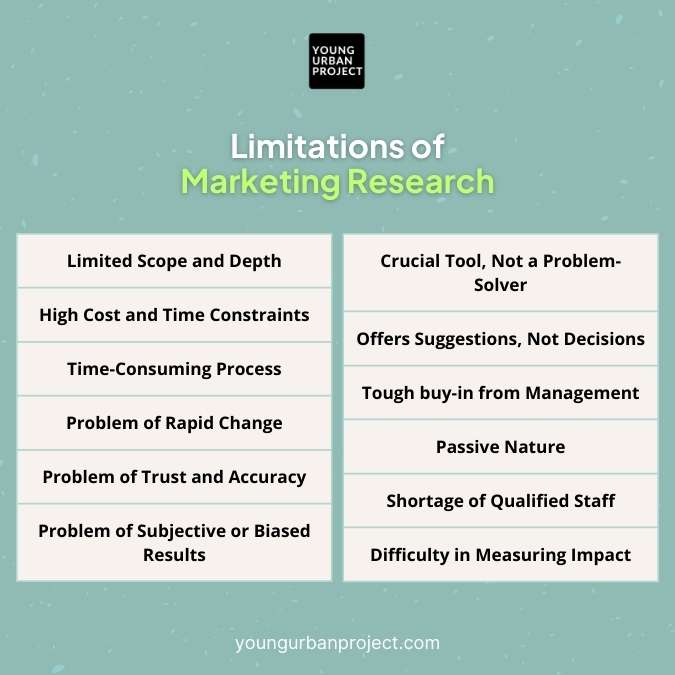
Young Urban Project
Your cart is currently empty!


12 Limitations of Marketing Research to remember while conducting it
Marketing research is a critical component in developing effective marketing strategies. It helps businesses understand their target audience, identify market trends, and make data-driven decisions.
However, like any tool, marketing research has its limitations. In this blog post, we will explore the key limitations of marketing research, providing insights and real-world examples to help you navigate these challenges effectively.
Table of Contents
What is Marketing Research?
Before diving into the limitations, it’s important to understand what marketing research entails . Marketing research involves the systematic collection, analysis, and interpretation of data related to marketing activities. It aims to provide insights that can help businesses understand market dynamics, customer behaviour, and competitive landscapes.
Types of Marketing Research
- Primary Research : Data collected directly from the source through surveys, interviews, focus groups, and observations.
- Secondary Research : Analysis of existing data from reports, studies, and market research databases.
Top 12 Limitations of Marketing Research

1. Limited Scope and Depth
Scope limitations of marketing research.
Marketing research often focuses on specific aspects of the market or customer behavior, which can limit its scope. For example, a survey conducted to understand customer preferences for a particular product might not capture broader market trends or external factors influencing customer decisions.
Example: A company conducting a survey on customer satisfaction with a new smartphone model may obtain valuable feedback on features and usability. However, the research might not reveal broader industry trends, such as shifts in consumer preferences towards eco-friendly technology .
Depth Limitations of marketing research
Some marketing research methods may not provide in-depth insights into complex consumer behavior. For instance, while surveys can capture quantitative data, they may not fully uncover the reasons behind customer preferences or the emotional drivers influencing their decisions.
Example: A survey indicating that 60% of respondents prefer a particular brand may not explain why they feel this way. In-depth interviews or focus groups might be needed to understand the underlying motivations.
2. High Cost and Time Constraints
Conducting comprehensive marketing research can be expensive, especially when utilizing advanced methods or large sample sizes. Costs can include data collection, analysis, and reporting.
For Example: Implementing a nationwide survey with a large sample size requires significant resources, which may not be feasible for small businesses or startups.
Also Read: Advantages and Disadvantages of Marketing Research
3. Time-Consuming Process
Marketing research can be time-consuming, from designing research instruments to collecting and analyzing data. This process involves many important steps. In other words, there are no short-cuts in MR. This can delay decision-making and impact a company’s ability to respond quickly to market changes.
Example: A company that needs to launch a new product on a close deadline might find that the time required for extensive market research delays their go-to-market strategy.
4. Problem of Rapid Change
Marketing research often struggles to stay relevant due to the rapid pace of technological advancements and changing consumer preferences. As new technologies like AI emerge and market conditions shift, research findings can quickly become outdated.
Economic changes and new competitors can also disrupt the market, making it challenging for research to keep up. To address these issues, marketing research must be continually updated and adaptable to reflect the latest trends and dynamics.
5. Problem of Trust and Accuracy
Ensuring trust and accuracy in marketing research is challenging due to several factors. The reliability of research depends on the quality of the data and its sources; data from unreliable or biased sources can lead to incorrect conclusions. Response bias, where respondents provide inaccurate or exaggerated answers, can further skew results.
Additionally, sampling issues arise when a sample does not accurately represent the larger population, leading to misleading findings. Researcher bias can also influence how data is interpreted, affecting objectivity.
Furthermore, data privacy and security concerns are crucial, as mismanagement or breaches can undermine trust in the research process. To address these challenges, it is essential to use robust methodologies, ensure transparency in reporting, and implement strong measures to protect data and minimize bias.
Also Read: Objectives of Marketing Research
6. Problem of Subjective or Biased Results
Marketing research can suffer from subjective or biased results, affecting its accuracy and reliability. Researcher bias, where personal interests or beliefs influence the interpretation of data, can skew findings. Similarly, poorly designed surveys or interview questions can lead respondents toward certain answers, distorting the data.
Response bias , where participants provide socially desirable answers instead of honest ones, also compromises objectivity. To reduce these issues, it’s important to use unbiased research methods, design studies carefully, and ensure transparency throughout the process.
7. Marketing Research is a Crucial Tool, Not a Problem-Solver
Marketing research is crucial for gaining insights and guiding decisions, but it doesn’t solve problems by itself. Instead, it provides valuable information that helps address challenges. The effectiveness of research depends on using reliable sources and applying the findings correctly. Even top-notch research won’t help if its results are ignored or misunderstood.
Example : Imagine a company with falling sales. Market research might uncover changes in customer preferences or product weaknesses. This information is essential, but it doesn’t fix the sales problem on its own. The company needs to act on these insights—like updating their product or tweaking their marketing strategy—to effectively tackle the issue. Without applying research insights in a practical way, the research alone won’t solve the problem.
8. Marketing Research Offers Suggestions, Not Decisions
Marketing research provides valuable insights and suggestions, but it doesn’t make decisions for you. Think of research as a guide that helps you understand market trends, customer preferences, and potential challenges. It collects and analyzes data to offer recommendations, but it’s up to you to make the final decisions based on this information.
Example : Imagine you’re considering launching a new product. Marketing research might reveal that there is strong demand for a feature you’re planning to include. While this insight suggests that the feature could be successful, it doesn’t dictate your exact course of action. You’ll need to weigh this information alongside other factors, such as budget, competition, and strategic goals, to make the final decision on whether to proceed with the product launch.
9. Challenges getting buy-in of Management
Marketing researchers provide valuable insights and recommendations to help executives make informed decisions. However, some management/executives are hesitant to fully embrace these suggestions. They worry that relying on research might expose them to risks if the recommendations lead to unfavorable outcomes, potentially affecting their job security and status.
Example : For instance, a major retail chain that was experiencing declining sales received research recommendations to change its product line to better align with new consumer trends. Some executives were initially reluctant to follow this advice due to fears of failure and personal risk. However, by carefully implementing the research-based recommendations alongside their own market knowledge, the company was able to successfully update its product offerings and improve sales.
10. Passive Nature of Marketing Research
One of the underrated limitations of Marketing research is its passive nature. This means it doesn’t take action on its own but provides information and insights. Sometimes, this can make the research seem too basic or even inaccurate when applied to business decisions. The conclusions from marketing research might be based on assumptions or incomplete data, rather than solid facts.
The real value of marketing research depends on how well marketing executives use it. The research itself doesn’t solve problems; it only offers guidance and suggestions. Executives need to actively interpret and apply these insights to make effective decisions.
In short, marketing research helps by pointing out possible directions, but it requires thoughtful use by executives to be truly useful.
11. Shortage of Qualified professionals
A significant challenge in marketing research is the shortage of qualified marketing research talent. Finding skilled professionals who can effectively conduct and interpret research is often difficult. Without the right expertise, research may lack depth and accuracy, leading to less reliable insights.
This shortage can impact the quality of research and, consequently, the decision-making process. Investing in training and development or seeking experienced professionals is crucial to overcoming this challenge and ensuring high-quality marketing research.
12. Difficulty in Measuring Research Impact
Another one of critical limitations of marketing research is the difficulty in measuring the direct impact of research findings on business outcomes. While research provides valuable insights, it can be challenging to quantify how these insights translate into tangible results like increased sales or improved customer satisfaction.
This lack of clear measurement can make it hard to assess the effectiveness of research and justify the investment in it. Companies can address this by setting specific, measurable objectives for research projects and tracking relevant performance metrics to better understand the impact of their research efforts.

Marketing research is crucial for making informed decisions, but it comes with limitations. It can be expensive and time-consuming, and findings may quickly become outdated due to rapid market changes. Additionally, issues such as accuracy and bias can affect the reliability of the results.
While marketing research offers valuable insights and suggestions, it does not solve problems or make decisions for you. It’s important to use research as a guide and apply its findings carefully, along with your own judgment and experience, to make better decisions.

FAQ About Limitation of Marketing Research
What are the main limitations of marketing research.
Marketing research has several key limitations, including high costs, time demands, and issues with data accuracy. These challenges can affect the quality and usefulness of the research.
How do cost and time constraints impact marketing research?
High costs and long timelines can limit the extent of marketing research. Expensive and time-consuming processes can delay decisions and be too costly for smaller businesses, reducing their ability to perform thorough research.
What problems can arise with the accuracy of marketing research data?
Accuracy issues can come from biased sources, participant dishonesty, or errors in sampling. These problems can lead to unreliable results and affect the overall credibility of the research.
How does the fast pace of industry change affect marketing research?
Rapid technological advances and shifting consumer preferences can quickly make research findings outdated. This fast pace makes it hard to keep research relevant and up-to-date. This is a reason why marketing research needs to be looked at as an ongoing effort, and not a one-time effort.
Why is it important to recognize the limitations of marketing research?
Knowing the limitations helps businesses interpret research results correctly and manage expectations. It ensures that research is used as a helpful guide rather than a final answer, leading to better decision-making and planning.
Your Article Library
Top 10 limitation of marketing research.
ADVERTISEMENTS:
Marketing research plays a crucial role in excelling marketing performance. In fact, it is inevitable to understand and treat customers more effectively than competitors. Marketer can satisfy customers by maintaining close contact with the target market by marketing research. It is one of the basic tasks of modern marketing. However, it is not free from limitations. Marketing manager must be aware of these limitations.
Main limitations or practical problems have been discussed as under:
1. Effect of Extraneous Factors :
Extraneous means external and uncontrollable factors. In most of the cases, the extraneous factors affect marketing research results adversely. Due to impact of such factors, the net impact cannot be estimated. For example, if marketer wants to study the impact of 10% price rise on demand and he raises price by 10%.
As a result, demand falls by 20%. Here, decrease in demand cannot be fully attributed to price hike only. Demand might have been affected by other factors like introduction of new superior product, attractive offer of competitors, availability of powerful substitutes, etc., over and above price rise. Whatever degree of precaution is taken, one cannot eliminate effect of such factors completely, and as a result, marketing research cannot serve the purpose.
2. Time Gap Makes Research Irrelevant :
Systematic marketing research project needs more time. It takes weeks, months, even years. When marketing research is carried on to investigate or solve the problem, final outcomes are available after considerable time. When outcomes are made available, situations might have been changed thoroughly or problem for which research was made might have been solved automatically. Decision-maker needs information in time. But, practically, it is not possible. Sometimes, time, money, and efforts contribute nothing.
3. Cost Consideration :
To conduct marketing research systematically is a luxury. A firm needs money for research design, data collection, data analysis, interpretation, and report preparation. Statisticians and computer experts charge heavy fees. When research is conducted regularly, a company has to maintain a separate well-equipped marketing research department. Marketing research has become costlier. So, it is difficult for medium and small companies to afford.
4. Problem of Rapid Change :
Today’s market is characterized by tremendous changes. Whatever is applicable or relevant today is out-dated tomorrow. Due to rapid changes, marketing research cannot serve the purpose. Research results or outcomes available after the specific time period seem irrelevant or meaningless.
5. Problem of Trust and Accuracy :
Marketing research is based on trust and accuracy. Right from the identification of problem to the final outcomes, all depends on trust. Company has to trust on marketing research officer; research officer has to trust on field officer; and field officer has to rely on response of respondents. At any stage of marketing research, accuracy is vital issue. To the extent inaccuracy prevails, marketing research results suffer.
6. It is not Problem Solving Technique but an Aid to Solve the Problem :
It is interesting and shocking to state that marketing research does not solve any problem directly. It is not a problem-solving technique but can assist to solve it. It is not a magic stick to solve marketing problems; it is a source of information. To the extent source is reliable and is used properly, it is useful. Even, an excellent research project is useless if outcomes are not considered.
7. Subjective or Biased Result :
When human being is involved, a completely bias-free response or result is not possible. Effect of personal value, prejudice, attitudes, needs, and other socio-cultural factors affect the objectivity of research adversely. Subjectivity may lead to utter chaos.
8. It cannot Eliminate Risks Inherent in Decision-making :
In every economic decisions, there exists risk and uncertainly. Marketing research cannot eliminate risk and uncertainty. It is an attempt to minimize degree of risk. So, heavy costs on marketing research don’t guarantee safety and certainty.
9. Applicability or Use :
Contribution of research project depends not only on quality and reliability alone, but also the proper use of information. Many times, marketing research reports remain just a formality for top management. Recommendations are neither considered seriously nor implemented fully.
10. Difference between Filed Officers, Data Analysts, and Decision- makers :
Marketing research activity involves a number of people such as marketing manager, field officer, data analysts, and finally decision-maker. All these people have different objectives, backgrounds, and perspectives. Consistency or parity among them is a vital issue. Unless high degree of integration and intimacy among them exit, one cannot expect a success. In fact, it is difficult.
Marketing manager and those involved in marketing research activity must be aware of these limitations/practical problems. Note that these limiting factors cannot be completely eradicated. Attempts should be made to minimize adverse impact of these limiting factors. Careful plan, adequate budget, teamwork, accuracy, timeliness, proper use and implementation, etc., have a strong prospect to contribute in successful marketing research.
Related Articles:
- Marketing Research: Scope, Advantage and Limitations |Marketing Management
- Limitations of Marketing Research
Comments are closed.

IMAGES
VIDEO